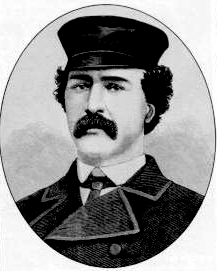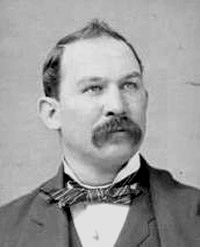Tom Allen roubado
Na quinta-feira, Setembro 7, 1876, Tom Allen defended his World Heavyweight Bare Knuckle Prizefighting Championship against fellow Englishman Joe Goss. Allen, originally from Birmingham, England, settled in St. Louis, Missouri. Allen eventually became a U.S. Citizen.
Allen showed a pugnacious personality, inside and outside the ring, making powerful enemies amongst the sporting men in the United States. Allen particularly irritated the New York prizefighting promoters and gamblers, who wanted to see Allen lose the title.

Picture of Tom Allen During His Prizefighting Days from the Public Domain
At the time, most states banned bare knuckle prizefighting. Allen and Goss fought in a clover field outside of Walton, Kentucky. The organizers placed lookouts around the field to watch for authorities.
The fight attracted sporting men from St. Louis, Cincinnati, Nova Iorque, and Louisville. The organizers struggled to keep the 500 fans from interfering with the bout. The fans booed Allen throughout the fight.
Allen sneered at the fans and prepared to battle Goss. Once the referee started the bout, Allen and Goss circled each other.
The fighter did not fight three-minute rounds. The fighters ended the round by throwing the opponent, knocking the opponent down, or the opponent taking a knee.
The first round went seven minutes as Allen and Goss circled each other. After Allen drew first blood from Goss, Allen and Goss clinched in the corner. Allen threw Goss to end the first round.
Allen punched Goss in the mouth to start the second round. Goss lands a few body blows before Allen throws Goss to end the second round.
Allen continued to press his advantage during the third round, when lookouts spotted the Covington Light Guard militia. The militia marched past the fight scene hoping to frighten off the crowd. Allen and Goss boxed for four more rounds before the militia marched back and caused the participants and fans to flee.

Joe Goss circa 1870s (Domínio Público)
The group fled to an area in Boone County, Kentucky, south of Walton. The Boone County Sheriff arrived at the fight scene but did not have a sufficient force to disperse the crowd. The sheriff sat and watched the rest of the fight.
Allen continued pummeling Goss, but Goss ended the eighth round by throwing Allen. Goss tried to pursue an advantage with Allen. Allen knocked down Goss to end the ninth round.
Allen and Goss exchanged heavy blows along the ropes in the tenth round. The seconds for both men had to pry the fighters apart.
Allen ended the eleventh, twelfth, and thirteenth rounds by knocking Goss down. Goss got in his own offense in the fourteenth round by throwing Allen. Allen’s seconds yelled for a foul, but the referee did not allow it.
For the next six rounds, Allen ended the round by knocking down Goss or Goss slipped and fell. By the end of the twentieth round, Allen had shut both Goss’s eyes and bloodied Goss’s lips and nose. Allen barely had a mark on him.
Allen continued pounding Goss in the twenty-first round when Goss slipped. Allen was punching Goss when Goss fell. One of Allen’s blows struck Goss when Goss was on his knees.
Goss’s corner men yelled foul. The referee allowed it and disqualified Allen. The referee awarded Goss the World Title on a disqualification.
Allen screamed that the referee robbed him of his title. Allen blamed the New York sporting men as the culprits conspiring with the referee to take his title. Newspaper reporters mostly supported Allen’s claim that the referee robbed Allen of his title.
Goss held the title until 1880 when Goss made his first title defense against Paddy Ryan. Paddy Ryan defeated Goss for the World Title in Goss’s only title defense.
Allen returned to England to fight for a few years before coming back to St. Louis. Allen owned a local bar in St. Louis that attracted all the sporting men of St. Louis. Allen shot a patron in self-defense during 1897. Allen died in St. Louis at the age of 62 em 1903.
You can leave a comment or ask a question about this or any post on my Facebook page.
Sources: O St. Louis Republican (St. Louis, Missouri), Setembro 8, 1876, p. 5
Pin It
